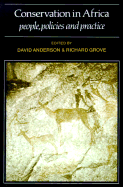Book contents
- Frontmatter
- Contents
- Preface
- List of contributors
- Introduction: The scramble for Eden: past, present and future in African conservation
- Part One Conservation ideologies in Africa
- Part Two Wildlife, Parks and Pastoralist
- Part Three Conservation priorities and rural communities
- Part Four Consequences for conservation and development
- Index
Introduction: The scramble for Eden: past, present and future in African conservation
Published online by Cambridge University Press: 04 April 2011
- Frontmatter
- Contents
- Preface
- List of contributors
- Introduction: The scramble for Eden: past, present and future in African conservation
- Part One Conservation ideologies in Africa
- Part Two Wildlife, Parks and Pastoralist
- Part Three Conservation priorities and rural communities
- Part Four Consequences for conservation and development
- Index
Summary
There is no doubting the seriousness of environmental and agrarian problems in Africa today in the eyes of the developed world. Human life, natural habitat, soils and species are all thought to be endangered in the continent to an extent never known before. The ‘crisis’ in Africa, whether enunciated in terms of sheer human suffering and the tragedy of famine, the threat to wildlife or the spread of desertification, is becoming a commonplace of academic and popular culture throughout the industrialised world and, not least, among urbanised Africans themselves. The western media, and television especially have helped to catalyse this development and, while often distorting and misrepresenting the issues, have linked the African predicament, at least temporarily, to the mainstream of European concerns. Even the very name ‘Africa’, it might be argued, has come to be equated with notions of doom and despondency that have very little to do with older connotations of Africa in the European mind. The more hopeful idea of Africa as a natural habitat teeming with spectacular wildlife has much older antecedents than the image conferred on the continent in the 1980s by famine. Equally the European interest in conserving the wildlife and habitats of Africa has a long history, much of it entirely ignorant of the long-established and successful ways in which Africans have ensured their own survival and that of the soils, plants and creatures which they need in order to live (Worthington, 1958; Darling, 1960; cf. Brokensha, Warren & Werner, 1980; Richards, 1985) and which form a basic part of the texture and meaning of rural, non-industrial existence.
- Type
- Chapter
- Information
- Conservation in AfricaPeoples, Policies and Practice, pp. 1 - 12Publisher: Cambridge University PressPrint publication year: 1988
- 16
- Cited by

